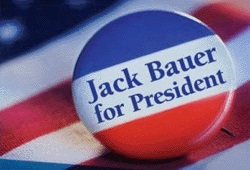
The FOX drama 24 premiered in 2001 shortly after the events of 9/11. Although conceived before those attacks and featuring “terrorists” who were not anti-American but merely foreigners seeking personal revenge, the series was still able to tap into the national zeitgeist of not only the year but the entire decade. A 2008 collection of essays entitled Jack Bauer for President: Terrorism and Politics in 24 explores both the ensuing popularity of 24 as well as its influence and importance in the post-9/11 world.
While the show’s use of torture – often employed by central character Jack Bauer – is the primary focus for a number of essays, other writers utilize 24 as the starting point to discuss espionage, why people lie, the lack of African American roles on popular television shows, and real-life examples of terrorist attacks that mirror those seen on the series. Additional essays, meanwhile, explore the importance of 24 in mainstream society during the early stages of the twenty-first century.
In her essay “The Jack Bauer School of Therapy,” for instance, Jeanne Cavelos argues that the series served as behavioral therapy for the post-traumatic stress that affected millions of Americans following 9/11 by allowing viewers to witness terrorist attacks in a non-stressful environment. Because those attacks are fictional, one could watch them detached from reality – without fear and in a more relaxed state – allowing for a better mental processing of the actual, horrific events of 9/11.
Cavelos also believes that the series offered viewers the opportunity to “role-play” by identifying with the characters and imagining how they would react in similar situations themselves, which served as an additional means of coping with terrorism.
Lorie Byrd, meanwhile, compares Jack Bauer to Clint Eastwood’s Harry Callahan, another law enforcement officer who regularly disobeyed his superiors and cared little for the rights of criminals. The first “Dirty Harry” was released during a period of the 1970s that saw a growing increase in crime. Furthermore, the film debuted after numerous Supreme Court decisions granted suspected criminals more rights than they had in the past. A large segment of the country believed those rulings hampered the police’s ability to catch the bad guys, thus making Harry Callahan’s actions appear heroic.
24, on the other hand, premiered at a time when terrorism that was on the public’s mind. As a debate erupted in the United States about how far the government should go to protect the rights of suspected terrorists – and whether those rights would hamper the ability to prevent additional terrorist attacks – along came Jack Bauer, disobeying authority and saving the day. Lorie Byrd believes that the nation needed Bauer to help reduce the tensions of the times in much the same way it needed Harry Callahan in the 1970s.
In “Simulating Terror,” Aaron Thomas Nelson notes that the appeal of 24 stretched across the political spectrum. This included both supporters as well as opponents of the Bush Doctrine, which stated that the United States needed to be more proactive in preventing terrorist attacks before they materialized. Nelson argues that this apparent contradiction in viewership ideology was due to the series intentionally playing to both sides of the political divide. Supporters of George W. Bush were drawn to Jack Bauer’s “the-ends-justify-the-means” mentality, for instance, which mirrored their belief that the country had to do whatever was needed to stop terrorism.
The Bush Doctrine, however, was based on the premise that terrorists were foreigners intent on destroying the ideals of the United States. 24 contradicts that assessment by using influential Americans interested in their own political agendas instead of foreign radicals as the culprits. 24 thus questioned the basic assumption the Bush Doctrine was based in the minds of liberals, while likewise justifying the means of combating terrorism that the doctrine advocated for conservatives.
Eric Green offers a different assessment in his essay “Jack Bauer Syndrome” for why liberals enjoyed 24. “Jack Bauer can do what you could never dream of,” he writes. “And get away with it. And that feels liberating.” Personal morals and beliefs may prevent viewers from ever acting like Jack Bauer or Harry Callahan, in other words, but it was still enjoyable to pretend that one could do so nonetheless.
Green likewise argues that 24 was not a celebration of the Bush Administration but a reflection of its failure instead. “Bauer and CTU win the battles that Bush and the Republicans have not,” he explains. “If The West Wing offered the fantasy of the Clinton Administration without Monica Lewinsky, 24 offers the fantasy of the Bush Administration without, well, the Bush Administration.”
When it comes to the topic of torture, however, Eric Green considers 24 to be “borderline dangerous.” As a civil rights activist from California, he believes that the use of torture in any form is irreprehensible and by continually showcasing it on 24, a debate opened in the country that should have remained closed.
Famed civil rights attorney Alan Dershowitz, on the other hand, advocates in Jack Bauer for President that non-lethal torture should be legalized in extreme circumstances. He likewise notes that the subject is one that needs to be openly discussed, especially within a free society like the United States.
“Regular viewers of 24 are keenly aware of the choice Jack Bauer generally makes,” Alan Dershowitz writes. “His job is to save innocent lives, not to strike appropriate balances between security and liberty. That choice must be made, in a democracy, by the people. 24 – along with other controversial ‘speech’ – helps to inform that choice.”
24 is that rare television series that not only entertains but both reflects and defines the times in which it aired. By showcasing fears, challenging ethical beliefs, and personifying heroic fantasies, it also played a key role in the nation’s cultural experiences. And as Jack Bauer for President makes obvious, it even added to the political debate, shaping both society and the country in the process.
Anthony Letizia

